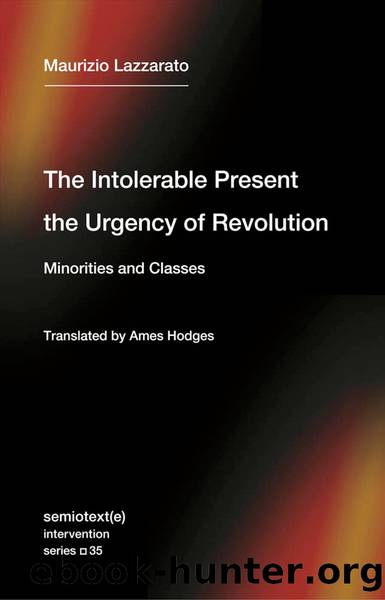The Intolerable Present, the Urgency of Revolution by Maurizio Lazzarato

Author:Maurizio Lazzarato [Lazzarato, Maurizio]
Language: eng
Format: epub
Publisher: MIT Press
Published: 2023-04-04T00:00:00+00:00
2.2âNormalization Precedes the Norm
The end goal of biopolitics, as model of the incorporation of power in norms, is ânormalizationâ in the sense that it makes a fundamentally ânormalizingâ power acceptable to the governed.
In his Concept of the Political, Carl Schmitt (there is more to learn from reactionaries than from âprogressivesâ as Marx suggested!) describes a functioning of norms that seems to show a better understanding of the nature of power exercised by Europe inside its borders and in the colonial world. The ânormalizationâ that targets the ânormative societyâ is not only the result but first a presupposition of its functioning, without which norms cannot operate. Normalization by the norm presumes a prior normalization by war, violence, and force. The establishment of order, for Schmitt, is the condition of existence of the juridical norm and, I would add, the biopolitical norm (symbolic and social).
âTo create tranquility, security, and order and thereby establish the normal situation is the prerequisite for legal norms to be valid. Every norm presupposes a normal situation, and no norm can be valid in an entirely abnormal situation.ââ16
In the same way that the law takes the non-law of capture as its origin, norms imply the nonnorms of imposition by force as their genealogy. anomie (of war and conquest) is the condition for production of the norm. Victory in civil wars and wars of conquest put an end to the âchaosâ and imposes a ânormalâ situation. Once the âorder established,â the arrangements of normalization can begin to act on subjectivity. Only once the order of the conquerors is ensured, once a âcompletely normal situationâ is imposed, the conquered can be subjected to the regime of âabstract laborâ and âunpaid labor,â to subjections (workers, women, slaves, indigenous and colonized peoples) and to the norms of disciplinary and âbiopoliticalâ behavior. The âpositiveâ action of norms requires the ânegativeâ action (destruction, repression, execution, genocide of civil war and war of conquest. The subjectivity of the âgovernedâ can only be built on the conditions of a more or less violent defeat that makes them pass from the status of political adversary to that of âconquered.â
Norms do not intervene first to construct and manage âproductiveâ or âreproductiveâ behavior, to ensure mere âcontrolâ of a population but, following a political conflict, a civil war, or a war of conquest, to guarantee the continuity of the distribution of acquired power. They operate in a relatively and temporarily pacified situation to stabilize and give continuity to the distribution of power that the conquerors imposed on the conquered. Only at this moment can one speak of a âpositiveâ action of power, because after preventing, prohibiting, and destroying, it makes us act, it solicits and incites us but only in the strict framework of governmentality and its subjections.
The society of norms is the continuation of war of conquest to transform to transform expropriated peasants into workers, impose domestic labor once the class of women is constituted by force and labor of (sexual, affective, etc.) production while, in the colonies,
Download
This site does not store any files on its server. We only index and link to content provided by other sites. Please contact the content providers to delete copyright contents if any and email us, we'll remove relevant links or contents immediately.
| Anarchism | Communism & Socialism |
| Conservatism & Liberalism | Democracy |
| Fascism | Libertarianism |
| Nationalism | Radicalism |
| Utopian |
The Secret History by Donna Tartt(19052)
The Social Justice Warrior Handbook by Lisa De Pasquale(12187)
Thirteen Reasons Why by Jay Asher(8893)
This Is How You Lose Her by Junot Diaz(6877)
Weapons of Math Destruction by Cathy O'Neil(6264)
Zero to One by Peter Thiel(5786)
Beartown by Fredrik Backman(5737)
The Myth of the Strong Leader by Archie Brown(5499)
The Fire Next Time by James Baldwin(5431)
How Democracies Die by Steven Levitsky & Daniel Ziblatt(5215)
Promise Me, Dad by Joe Biden(5141)
Stone's Rules by Roger Stone(5081)
A Higher Loyalty: Truth, Lies, and Leadership by James Comey(4954)
100 Deadly Skills by Clint Emerson(4921)
Rise and Kill First by Ronen Bergman(4779)
Secrecy World by Jake Bernstein(4741)
The David Icke Guide to the Global Conspiracy (and how to end it) by David Icke(4706)
The Farm by Tom Rob Smith(4502)
The Doomsday Machine by Daniel Ellsberg(4484)
